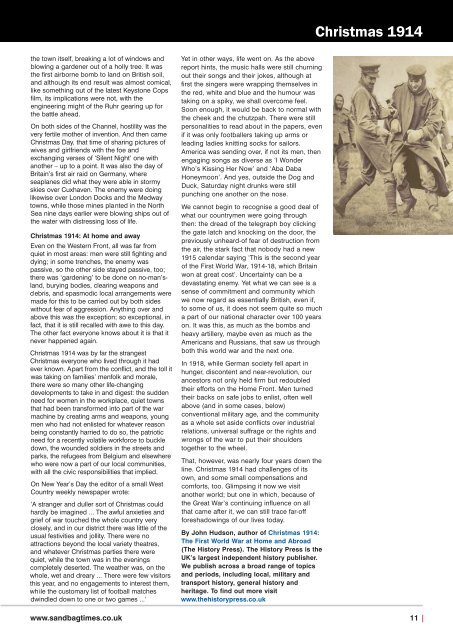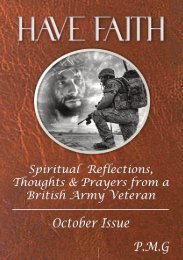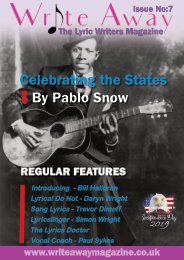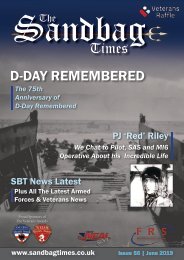The Sandbag Times Issue No: 38
The Veterans Magazine
The Veterans Magazine
- No tags were found...
You also want an ePaper? Increase the reach of your titles
YUMPU automatically turns print PDFs into web optimized ePapers that Google loves.
the town itself, breaking a lot of windows and<br />
blowing a gardener out of a holly tree. It was<br />
the first airborne bomb to land on British soil,<br />
and although its end result was almost comical,<br />
like something out of the latest Keystone Cops<br />
film, its implications were not, with the<br />
engineering might of the Ruhr gearing up for<br />
the battle ahead.<br />
On both sides of the Channel, hostility was the<br />
very fertile mother of invention. And then came<br />
Christmas Day, that time of sharing pictures of<br />
wives and girlfriends with the foe and<br />
exchanging verses of ‘Silent Night’ one with<br />
another – up to a point. It was also the day of<br />
Britain’s first air raid on Germany, where<br />
seaplanes did what they were able in stormy<br />
skies over Cuxhaven. <strong>The</strong> enemy were doing<br />
likewise over London Docks and the Medway<br />
towns, while those mines planted in the <strong>No</strong>rth<br />
Sea nine days earlier were blowing ships out of<br />
the water with distressing loss of life.<br />
Christmas 1914: At home and away<br />
Even on the Western Front, all was far from<br />
quiet in most areas: men were still fighting and<br />
dying; in some trenches, the enemy was<br />
passive, so the other side stayed passive, too;<br />
there was ‘gardening’ to be done on no-man’sland,<br />
burying bodies, clearing weapons and<br />
debris, and spasmodic local arrangements were<br />
made for this to be carried out by both sides<br />
without fear of aggression. Anything over and<br />
above this was the exception; so exceptional, in<br />
fact, that it is still recalled with awe to this day.<br />
<strong>The</strong> other fact everyone knows about it is that it<br />
never happened again.<br />
Christmas 1914 was by far the strangest<br />
Christmas everyone who lived through it had<br />
ever known. Apart from the conflict, and the toll it<br />
was taking on families’ menfolk and morale,<br />
there were so many other life-changing<br />
developments to take in and digest: the sudden<br />
need for women in the workplace, quiet towns<br />
that had been transformed into part of the war<br />
machine by creating arms and weapons, young<br />
men who had not enlisted for whatever reason<br />
being constantly harried to do so, the patriotic<br />
need for a recently volatile workforce to buckle<br />
down, the wounded soldiers in the streets and<br />
parks, the refugees from Belgium and elsewhere<br />
who were now a part of our local communities,<br />
with all the civic responsibilities that implied.<br />
On New Year’s Day the editor of a small West<br />
Country weekly newspaper wrote:<br />
‘A stranger and duller sort of Christmas could<br />
hardly be imagined ... <strong>The</strong> awful anxieties and<br />
grief of war touched the whole country very<br />
closely, and in our district there was little of the<br />
usual festivities and jollity. <strong>The</strong>re were no<br />
attractions beyond the local variety theatres,<br />
and whatever Christmas parties there were<br />
quiet, while the town was in the evenings<br />
completely deserted. <strong>The</strong> weather was, on the<br />
whole, wet and dreary ... <strong>The</strong>re were few visitors<br />
this year, and no engagements to interest them,<br />
while the customary list of football matches<br />
dwindled down to one or two games ...’<br />
Yet in other ways, life went on. As the above<br />
report hints, the music halls were still churning<br />
out their songs and their jokes, although at<br />
first the singers were wrapping themselves in<br />
the red, white and blue and the humour was<br />
taking on a spiky, we shall overcome feel.<br />
Soon enough, it would be back to normal with<br />
the cheek and the chutzpah. <strong>The</strong>re were still<br />
personalities to read about in the papers, even<br />
if it was only footballers taking up arms or<br />
leading ladies knitting socks for sailors.<br />
America was sending over, if not its men, then<br />
engaging songs as diverse as ‘I Wonder<br />
Who’s Kissing Her <strong>No</strong>w’ and ‘Aba Daba<br />
Honeymoon’. And yes, outside the Dog and<br />
Duck, Saturday night drunks were still<br />
punching one another on the nose.<br />
We cannot begin to recognise a good deal of<br />
what our countrymen were going through<br />
then: the dread of the telegraph boy clicking<br />
the gate latch and knocking on the door, the<br />
previously unheard-of fear of destruction from<br />
the air, the stark fact that nobody had a new<br />
1915 calendar saying ‘This is the second year<br />
of the First World War, 1914-18, which Britain<br />
won at great cost’. Uncertainty can be a<br />
devastating enemy. Yet what we can see is a<br />
sense of commitment and community which<br />
we now regard as essentially British, even if,<br />
to some of us, it does not seem quite so much<br />
a part of our national character over 100 years<br />
on. It was this, as much as the bombs and<br />
heavy artillery, maybe even as much as the<br />
Americans and Russians, that saw us through<br />
both this world war and the next one.<br />
In 1918, while German society fell apart in<br />
hunger, discontent and near-revolution, our<br />
ancestors not only held firm but redoubled<br />
their efforts on the Home Front. Men turned<br />
their backs on safe jobs to enlist, often well<br />
above (and in some cases, below)<br />
conventional military age, and the community<br />
as a whole set aside conflicts over industrial<br />
relations, universal suffrage or the rights and<br />
wrongs of the war to put their shoulders<br />
together to the wheel.<br />
That, however, was nearly four years down the<br />
line. Christmas 1914 had challenges of its<br />
own, and some small compensations and<br />
comforts, too. Glimpsing it now we visit<br />
another world; but one in which, because of<br />
the Great War’s continuing influence on all<br />
that came after it, we can still trace far-off<br />
foreshadowings of our lives today.<br />
By John Hudson, author of Christmas 1914:<br />
<strong>The</strong> First World War at Home and Abroad<br />
(<strong>The</strong> History Press). <strong>The</strong> History Press is the<br />
UK’s largest independent history publisher.<br />
We publish across a broad range of topics<br />
and periods, including local, military and<br />
transport history, general history and<br />
heritage. To find out more visit<br />
www.thehistorypress.co.uk<br />
www.sandbagtimes.co.uk 11 |


















